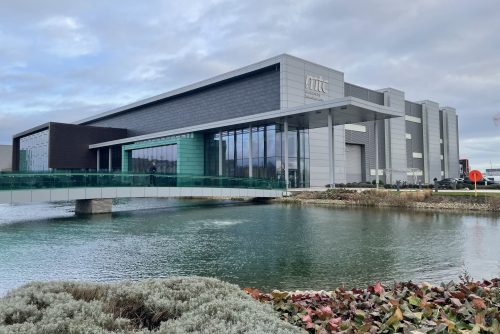Race to net zero ‘biggest challenge faced in a generation,’ says manufacturing boss

For the second time, the National Manufacturing Summit has been held at Coventry’s Manufacturing Technology Centre (MTC).
With the country’s manufacturers gathered in person and online, discussions ranged from the switch from fossil fuels to renewable energy, nuclear and hydrogen power to how the UK can adopt vertical farming practices.
Amid the busy day, TheBusinessDesk.com caught up Dr Clive Hickman, CEO of MTC to discuss the strategy he feels the UK needs to achieve net-zero targets.
Dr Hickman said the summit aims to follow on from the COP26, to give a manufacturing view in comparison to the political view of how to become net-zero.
He said: “This conference is a manufacturing view of net-zero and zero-carbon and what we can do as an industry to support the government to implement their policies. Whatever policies the government writes, will be implemented by engineers and manufacturers. It’s really important that we follow through to try to bring those things together.”
Dr Hickman outlined the MTC’s strategy to facilitate the targets, with one key area being upskilling and retraining workers.
“When we start to look at people moving from internal combustion engines to making electric vehicles, the skill is going to be different. How do we upskill and rescale and retrain people to be able to do those things?
“Are 50,000 people in the West Midlands who are working on combustion engine products will be displaced in 10 years time if we go electric vehicles. We won’t be making any valves or springs or rods or crankshafts.
“With an electric vehicle, you’ve got a rotor and the stator so it’s a simpler product to make. But then you’ve got a battery. And a battery is a very complex product to make. But the battery has got a finite life. And when it comes to the end of life, we’ve got to disassemble that battery.
“We need to look at the lifecycle of these products so we train people on how to make the product but we’ve also got to train people on how to disassemble the product.”
Another key theme was the creation of a net zero fund, as Dr Hickman explains manufacturers can come up with ideas and receive funding from an angel investor, but between idea and production, there is no real funding mechanism available.
He said: “We need the engineers and the scientists to develop the technologies, but we need the funding to be able to bring those technologies from concept to production, where the rest of the industry will then invest in.”
On top of this, Dr Hickman explained that 80% of the vehicles we make are exported and 80% of the vehicles we drive are imported.
He said: “When it comes to that end of life of the battery, a lot of our batteries will be elsewhere in the world. Then batteries at the end of life in the UK will have been made by people somewhere else in the world. We can’t ship them back.
“There needs to be a concerted effort, I think around the world to get some consistency into where and how we make these batteries.”
A theme of the day was echoed by Lord David Willetts, the President of the Resolution Foundation, was that the pace of creating de-carbonising technologies needs to rapidly increase.
Dr Hickman referenced Moore’s Law, meaning that technology doubles every fixed period of time, depending on what the technology is.
Giving the example of semiconductors he said: “In comparison to the things we had ten years ago and the semiconductors we have now, they’re a fraction of the price and a fraction of the size. That’s what will happen with the technologies for electric for net-zero.
“The cost will come down over time, relative to Moore’s law as we invest more in the technology and we understand how to make it better, make it more efficient and make it smaller.”
With the summit taking place in the Midlands, the start and heart of the Industrial Revolution, Dr Hickman reminded us that the race to net zero is up to us.
“This is probably the biggest challenge that’s going to be faced by our generation.
“We’ve got to solve this for the future and it will only be solved by engineers and manufacturing engineers, it won’t be solved by the politicians.”








